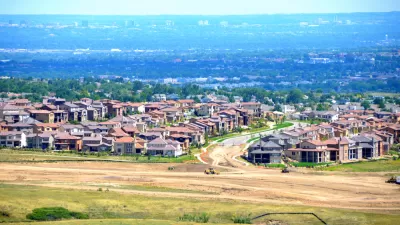In a dozen local land use measures Tuesday in California, voters approved jobs-oriented projects but not housing-oriented projects. Split decision on downtown plans.
If skepticism about growth is an indication that the economy is on the rebound, then Tuesday's land use elections throughout California might be called good news. About a dozen land use measures were on the ballot Tuesday and most cases the anti-growth forces won. Most of those that did win were focused on job creation. Several measures focused on downtown development in small cities, with mixed results.
Although the land use ballot measures were -- as usual -- random and scattered, they suggest that voters were in a more anti-growth mood than you'd expect, given the lengthy slump in real estate development around the state.
In only a couple of places did the pro-growth forces win, and some of those victories were sold as job creators. In Escondido in North San Diego County, Measure N passed, rezoning hundreds of acres of land to commercial use. In Berkeley, an update to the West Berkeley Plan -- also intended to create jobs -- is hanging on by 50.2%. Voters in rural, conservative Yuba County rejected a SOAR-style ballot measure that would have subjected changes in agricultural zoning to a vote.
On the other side of the ledger, voters in Fullerton turned down a major project, the West Coyote Hills plan. Major projects were also turned down in Del Mar and Napa County.
Thanks to Bill Fulton
FULL STORY: Voters Say Yes to Jobs, No to Other Development in Tuesday Balloting

Alabama: Trump Terminates Settlements for Black Communities Harmed By Raw Sewage
Trump deemed the landmark civil rights agreement “illegal DEI and environmental justice policy.”

Planetizen Federal Action Tracker
A weekly monitor of how Trump’s orders and actions are impacting planners and planning in America.

The 120 Year Old Tiny Home Villages That Sheltered San Francisco’s Earthquake Refugees
More than a century ago, San Francisco mobilized to house thousands of residents displaced by the 1906 earthquake. Could their strategy offer a model for the present?

In Both Crashes and Crime, Public Transportation is Far Safer than Driving
Contrary to popular assumptions, public transportation has far lower crash and crime rates than automobile travel. For safer communities, improve and encourage transit travel.

Report: Zoning Reforms Should Complement Nashville’s Ambitious Transit Plan
Without reform, restrictive zoning codes will limit the impact of the city’s planned transit expansion and could exclude some of the residents who depend on transit the most.

Judge Orders Release of Frozen IRA, IIJA Funding
The decision is a victory for environmental groups who charged that freezing funds for critical infrastructure and disaster response programs caused “real and irreparable harm” to communities.
Urban Design for Planners 1: Software Tools
This six-course series explores essential urban design concepts using open source software and equips planners with the tools they need to participate fully in the urban design process.
Planning for Universal Design
Learn the tools for implementing Universal Design in planning regulations.
Clanton & Associates, Inc.
Jessamine County Fiscal Court
Institute for Housing and Urban Development Studies (IHS)
City of Grandview
Harvard GSD Executive Education
Toledo-Lucas County Plan Commissions
Salt Lake City
NYU Wagner Graduate School of Public Service





























